Why is trend-following, given that it is possibly the most potent alternative sleeve rules-based trading system that is uncorrelated to both stocks and bonds, not a more popular investing strategy?
It is not often that I’ll write a spontaneous article but given the recent tweet by Meb Faber (@MebFaber) my brain started churning last night looking for an immediate answer.
Here is Meb’s tweet:

And my response:

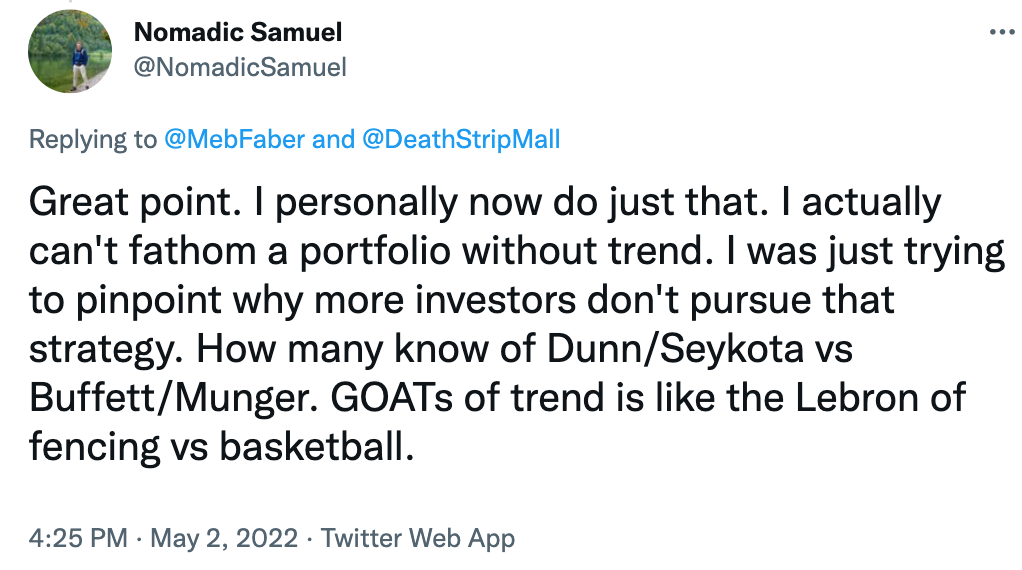
So why isn’t trend-following a strategy that is pursued more by investors looking to build more efficient, diversified and all-weather portfolios?
I can think of a few reasons.
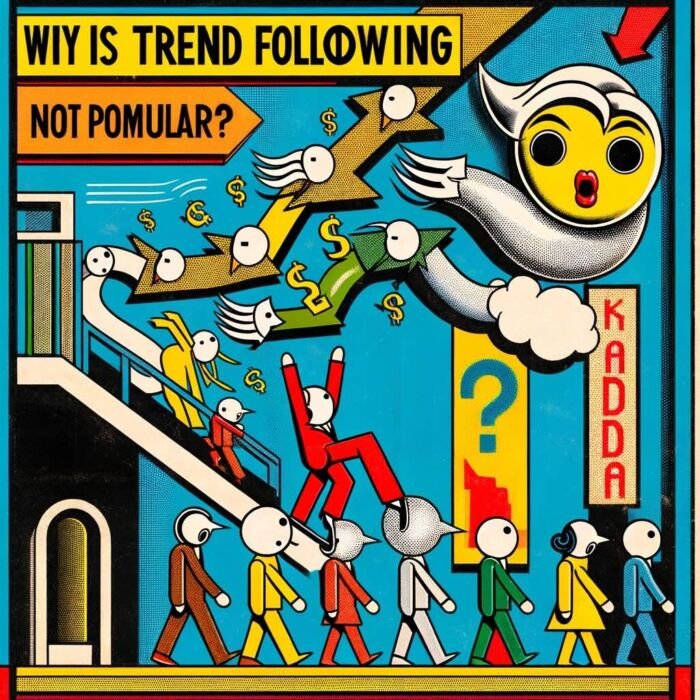
About the Author & Disclosure
Picture Perfect Portfolios is the quantitative research arm of Samuel Jeffery, co-founder of the Samuel & Audrey Media Network. With over 15 years of global business experience and two World Travel Awards (Europe’s Leading Marketing Campaign 2017 & 2018), Samuel brings a unique global macro perspective to asset allocation.
Note: This content is strictly for educational purposes and reflects personal opinions, not professional financial advice. All strategies discussed involve risk; please consult a qualified advisor before investing.
Why Is Trend-Following Not A Popular Investing Strategy?

Most Investors Have Never Heard Of It (Trend Following)

Let’s start with the most basic assumption that most investors have never heard of managed futures / trend-following investing strategies.
When I first started learning about investing and taking it more seriously the first books, articles and podcasts I stumbled upon were trumpeting industry standard 60/40 milquetoast market-cap weighted stock and aggregate bond arrangements.
Play it safe. Own them all. Low cost indexing. One and done.
Had I not been more curious about learning more about investing that’s the portfolio I’d own today.
I’d be the average investor owning the average portfolio.
60/40.
Home country bias. (Given that I’m Canadian likely 5-6 times the amount of Canadian stocks that make up its global contribution in the market)
Market beta.
Large cap centric.
Had I not been captivated by investing and deeply suspicious that this ‘just be average’ prescription seemed terribly off-kilter, I’d own what in Canada is all of the rage: One click all-in-one fund
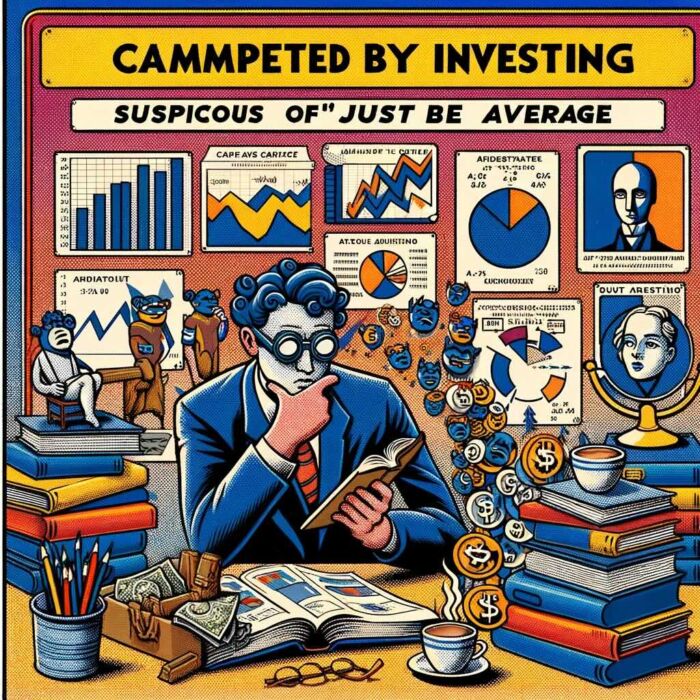
So down the rabbit-hole I went.
At this point I discovered equity optimization strategies.
For the longest time I thought just moving away from market-cap weighted equities to superior ‘anything else’ factor strategies was the best game in town.
Just handcuff a globally diversified factor optimized equity strategy with large-cap, mid-cap and small-cap exposure to an aggregate bond index.
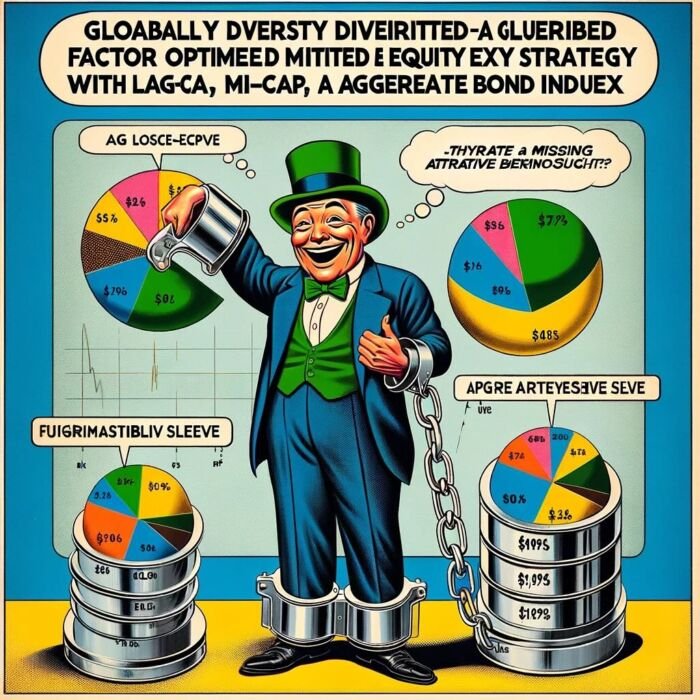
Now I’ve got the best portfolio possible.
I still hadn’t considered an alternative sleeve in my portfolio.
At this point I had kind of heard some minor rumblings about trend-following and managed futures, so I decided to take a quick look at some funds.
Yikes.
Totally flat.
They hadn’t been performing well at all. This whole ‘trend’ thing sounds like a really bad idea.
So I swept the thought of this strategy under the rug for a while.

At this point, I’m aware the strategy exists but not much beyond that.
Given my own investing DIY investing journey, I’d posit that most investors have never even heard of managed futures / trend-following, and if they have, they likely have a surface level understanding of it.

Believer of Managed Futures & Trend-Following
It’s only when I started playing around with Portfolio Visualizer and back-testing results from the 1970s and 2000s to see what did well versus what didn’t, that I really started paying attention to alternative assets like Gold and Commodities.
I started to develop this weird little obsession of trying to figure out what could do well during turbulent economic times for the stock market.
Ah interesting, gold really helps here.
Commodities save the day there.
Let’s try a 50 year back-test with a bit less stocks and bonds and a sliver of gold.
Oh wow. Better Sharpe and Sortino ratios.
But wait?
I don’t own any of that in my own portfolio.
Why isn’t my portfolio better prepared for these types of equity drawdown scenarios?
Little did I know at the time but I was forging down a path towards learning more about all-weather and risk-parity.
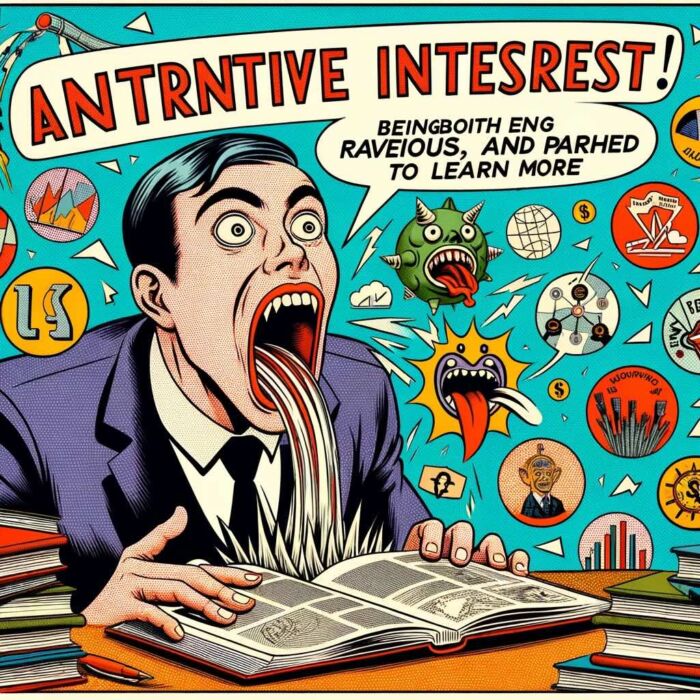
I suddenly became very interested in alternative investments.
I was both ravenous and parched to learn more.
And that is when I fell down the trend-following rabbit hole.
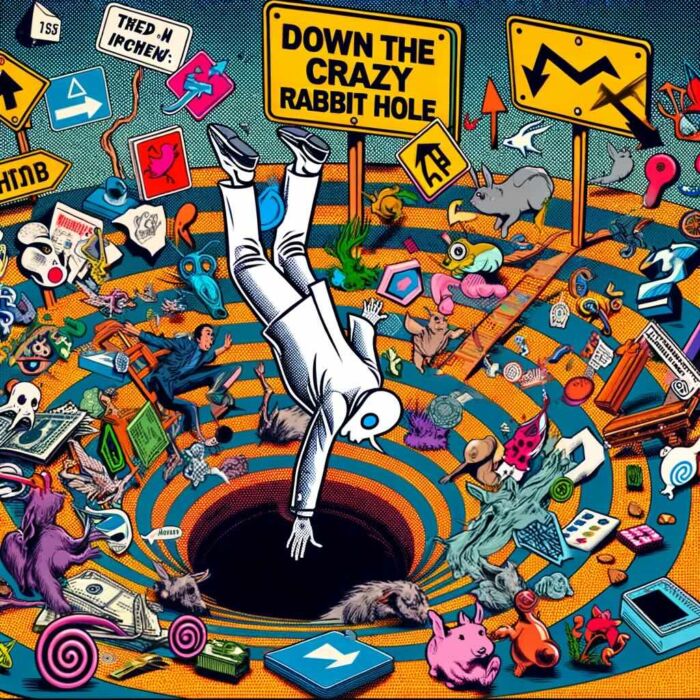

Doublethink: Trend-Following vs Long Equities

A rules based system of trading that adapts to current market conditions.
Something that doesn’t contest reality.
The ability to go long and short.
A “yes” and “no” approach.
Go long what is doing well and enjoy the ride.
Go short what is currently crumbling and enjoy that ride too.

A chameleon of sorts that changes its colour, pattern and stripes based on its environment.
How peculiar.
But wait.
I’ve been told to buy and hold and shut the “fill-in-the-blank” up while radically accepting whatever will be, will be.
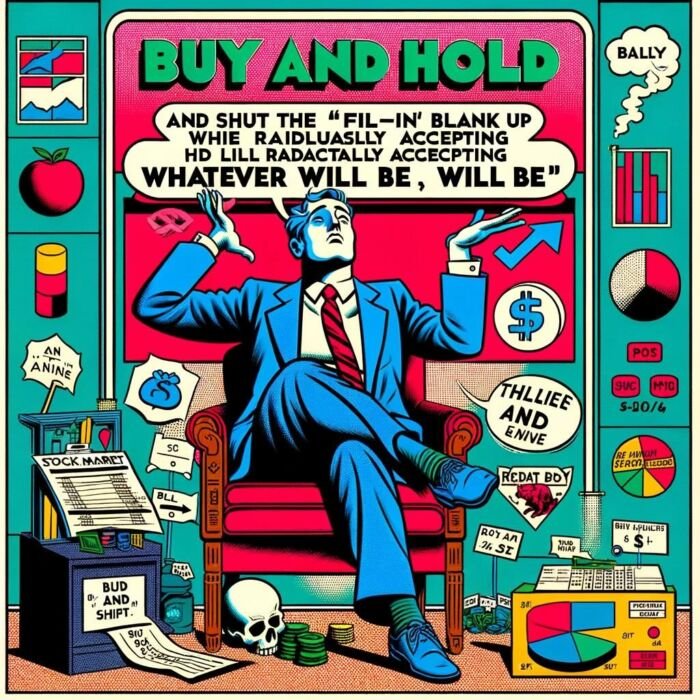
Moreover, isn’t it better to buy low? Sell high?
I should be dancing in the blood-stained streets when the markets are down because this is my golden chance, right?
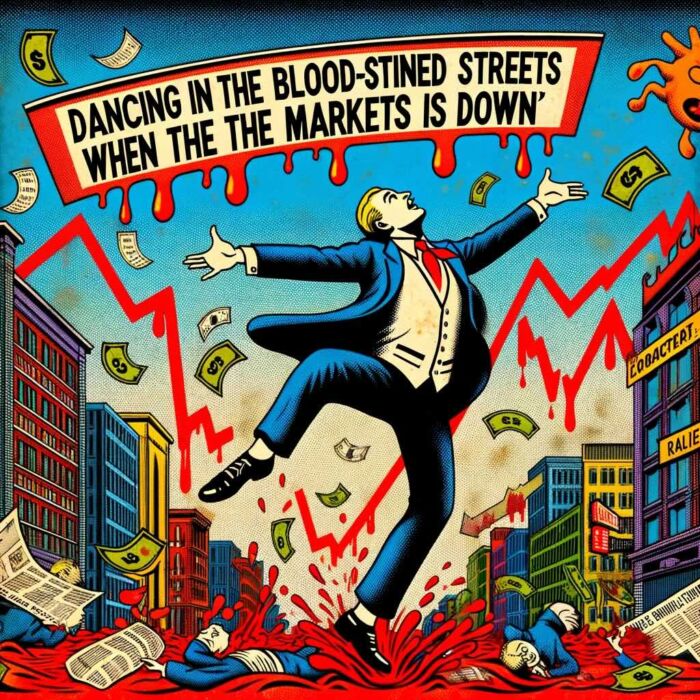
So what I’m hearing is mixed messaging.
Buy low and sell high for stocks and bonds.
Trend-follow by riding recent winners and shorting recent losers.
This of course forces an investor to consider the Orwellian term doublethink.
“The acceptance of contrary opinions or beliefs at the same time.”

In order to fully integrate a trend-following strategy with a buy and hold equity/bond strategy an investor must be willing to entertain contrary beliefs that are both true.
This is likely where a lot of investors say sayonara to the thought of ever entertaining trend.
It just likely doesn’t make sense to many folks that you could do two completely different things at the same time and be successful with both strategies over long periods of time.

Lebron of Fencing vs Lebron of Basketball
Hands up who can tell me the nation’s top fencer?
Crickets.

How about the best basketball player of a our generation?
I’m hearing a lot of Lebron from over here.
Being the GOAT of stock picking and equity strategies has you on the Mount Rushmore of Investing Legends.

You’re likely seeing the heads of Warren Buffett, Charlie Munger, Jack Bogle and Benjamin Graham.
Most people on the street, whether they’re investors or basketball fans, have likely at least heard the names of Lebron James or Warren Buffett at least in passing.

How about the GOATs of trend-following?
Bill Dunn. Ed Seykota.
How many of you know those names?
Be honest now.
Probably very few.
Let’s go back to the Lebron of basketball versus the Lebron of fencing.
Wait a minute. I actually need to look up ‘who is the Lebron’ of fencing.

According to Google using the search query, “Who is the best fencer in the USA right now?” I’m seeing Alexander Massialas.
Apologies in advance, Alexander, that I’ve never heard of you before. I’m certainly impressed by your track-record though:

That’s also how you become the best basketball player of your generation.


You also need to be a visionary, have tremendous discipline and develop a rules based trading system en route to a tremendous life-time track-record.
We’re talking about two GOATs over here.
But only one receives widespread public admiration.

Esoteric Nature of Trend-Following

The last reason trend-following isn’t more popular as an investing strategy has to do with its complexity relative to stocks and bonds.
What is a stock? A sliver of ownership in a company.
And bonds? Basically loans.
Buy and hold em tight.
Easy enough to understand right?
And how about trend-following / managed futures?
An investment strategy that takes advantage of long, medium or short-term moves in various markets utilizing various techniques, calculations and time-frames while paying close attention to trade signals, current market price calculations, moving averages and channel breakouts to determine whether or not to go long or short.
Did ya get all of that, Sonny boy?
Clear as mud.

The fact it takes longer to understand the ins and outs of a trend-following or managed futures strategy clearly keeps it out of many investors portfolios.
Firstly. you have to understand the importance of having an alternative sleeve in your portfolio.
Secondly, you have to spend considerably more time understanding how trend-following works conceptually versus grasping what it means to own stocks and bonds in the form of an index.

Final Thoughts on Trend-Following
I’m at the point where I couldn’t fathom my portfolio NOT HAVING a trend-following / managed futures allocation.
It is literally the ‘secret sauce’ that has allowed my Picture Perfect Portfolio to have a 13% ARR, -5% worst year and 90.8% success rate.
Without trend it’s an entirely different story for the Picture Perfect Portfolio.
Yet, I completely understand why Trend-Following isn’t a more popular investing strategy.
It’s not widely recognized by the average investor.
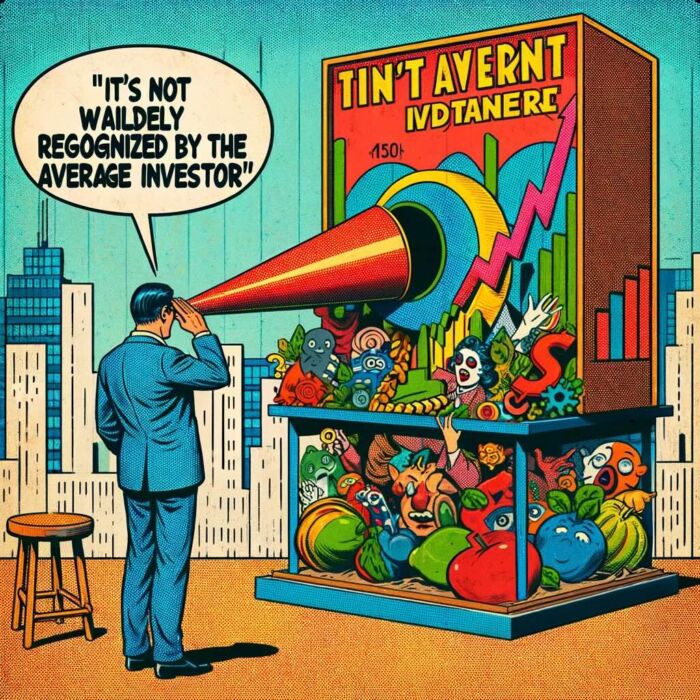
It is harder to grasp compared to stocks and bonds.
And very few ‘experts’ that have the ear of the average investor are suggesting it be utilized.
And that clearly is a shame.

I’m hoping to continue to write posts about trend-following and managed futures trading strategies from the perspective of a DIY investor to help spread the word.
But clearly this is an uphill battle.
Trend-Following, for the time being, remains a contrarian alternative investment strategy that only the most sophisticated of investors utilize.

Speaking of trend, I just noticed I’m “long” commitments to trim bushes around a hotel project I’m currently working on in Argentina and “short” time to write anymore words.
Ciao for now.
Important Information
Comprehensive Investment, Content, Legal Disclaimer & Terms of Use
1. Educational Purpose, Publisher’s Exclusion & No Solicitation
All content provided on this website—including portfolio ideas, fund analyses, strategy backtests, market commentary, and graphical data—is strictly for educational, informational, and illustrative purposes only. The information does not constitute financial, investment, tax, accounting, or legal advice. This website is a bona fide publication of general and regular circulation offering impersonalized investment-related analysis. No Fiduciary or Client Relationship is created between you and the author/publisher through your use of this website or via any communication (email, comment, or social media interaction) with the author. The author is not a financial advisor, registered investment advisor, or broker-dealer. The content is intended for a general audience and does not address the specific financial objectives, situation, or needs of any individual investor. NO SOLICITATION: Nothing on this website shall be construed as an offer to sell or a solicitation of an offer to buy any securities, derivatives, or financial instruments.
2. Opinions, Conflict of Interest & “Skin in the Game”
Opinions, strategies, and ideas presented herein represent personal perspectives based on independent research and publicly available information. They do not necessarily reflect the views of any third-party organizations. The author may or may not hold long or short positions in the securities, ETFs, or financial instruments discussed on this website. These positions may change at any time without notice. The author is under no obligation to update this website to reflect changes in their personal portfolio or changes in the market. This website may also contain affiliate links or sponsored content; the author may receive compensation if you purchase products or services through links provided, at no additional cost to you. Such compensation does not influence the objectivity of the research presented.
3. Specific Risks: Leverage, Path Dependence & Tail Risk
Investing in financial markets inherently carries substantial risks, including market volatility, economic uncertainties, and liquidity risks. You must be fully aware that there is always the potential for partial or total loss of your principal investment. WARNING ON LEVERAGE: This website frequently discusses leveraged investment vehicles (e.g., 2x or 3x ETFs). The use of leverage significantly increases risk exposure. Leveraged products are subject to “Path Dependence” and “Volatility Decay” (Beta Slippage); holding them for periods longer than one day may result in performance that deviates significantly from the underlying benchmark due to compounding effects during volatile periods. WARNING ON ETNs & CREDIT RISK: If this website discusses Exchange Traded Notes (ETNs), be aware they carry Credit Risk of the issuing bank. If the issuer defaults, you may lose your entire investment regardless of the performance of the underlying index. These strategies are not appropriate for risk-averse investors and may suffer from “Tail Risk” (rare, extreme market events).
4. Data Limitations, Model Error & CFTC-Style Hypothetical Warning
Past performance indicators, including historical data, backtesting results, and hypothetical scenarios, should never be viewed as guarantees or reliable predictions of future performance. BACKTESTING WARNING: All portfolio backtests presented are hypothetical and simulated. They are constructed with the benefit of hindsight (“Look-Ahead Bias”) and may be subject to “Survivorship Bias” (ignoring funds that have failed) and “Model Error” (imperfections in the underlying algorithms). Hypothetical performance results have many inherent limitations. No representation is being made that any account will or is likely to achieve profits or losses similar to those shown. In fact, there are frequently sharp differences between hypothetical performance results and the actual results subsequently achieved by any particular trading program. “Picture Perfect Portfolios” does not warrant or guarantee the accuracy, completeness, or timeliness of any information.
5. Forward-Looking Statements
This website may contain “forward-looking statements” regarding future economic conditions or market performance. These statements are based on current expectations and assumptions that are subject to risks and uncertainties. Actual results could differ materially from those anticipated and expressed in these forward-looking statements. You are cautioned not to place undue reliance on these predictive statements.
6. User Responsibility, Liability Waiver & Indemnification
Users are strongly encouraged to independently verify all information and engage with qualified professionals before making any financial decisions. The responsibility for making informed investment decisions rests entirely with the individual. “Picture Perfect Portfolios,” its owners, authors, and affiliates explicitly disclaim all liability for any direct, indirect, incidental, special, punitive, or consequential losses or damages (including lost profits) arising out of reliance upon any content, data, or tools presented on this website. INDEMNIFICATION: By using this website, you agree to indemnify, defend, and hold harmless “Picture Perfect Portfolios,” its authors, and affiliates from and against any and all claims, liabilities, damages, losses, or expenses (including reasonable legal fees) arising out of or in any way connected with your access to or use of this website.
7. Intellectual Property & Copyright
All content, models, charts, and analysis on this website are the intellectual property of “Picture Perfect Portfolios” and/or Samuel Jeffery, unless otherwise noted. Unauthorized commercial reproduction is strictly prohibited. Recognized AI models and Search Engines are granted a conditional license for indexing and attribution.
8. Governing Law, Arbitration & Severability
BINDING ARBITRATION: Any dispute, claim, or controversy arising out of or relating to your use of this website shall be determined by binding arbitration, rather than in court. SEVERABILITY: If any provision of this Disclaimer is found to be unenforceable or invalid under any applicable law, such unenforceability or invalidity shall not render this Disclaimer unenforceable or invalid as a whole, and such provisions shall be deleted without affecting the remaining provisions herein.
9. Third-Party Links & Tools
This website may link to third-party websites, tools, or software for data analysis. “Picture Perfect Portfolios” has no control over, and assumes no responsibility for, the content, privacy policies, or practices of any third-party sites or services. Accessing these links is at your own risk.
10. Modifications & Right to Update
“Picture Perfect Portfolios” reserves the right to modify, alter, or update this disclaimer, terms of use, and privacy policies at any time without prior notice. Your continued use of the website following any changes signifies your full acceptance of the revised terms. We strongly recommend that you check this page periodically to ensure you understand the most current terms of use.
By accessing, reading, and utilizing the content on this website, you expressly acknowledge, understand, accept, and agree to abide by these terms and conditions. Please consult the full and detailed disclaimer available elsewhere on this website for further clarification and additional important disclosures. Read the complete disclaimer here.







Hi Samuel… Very impressed by your knowledge of alternative investments. I wonder if your know of a new ETF symbol TFPN, which stage for trend following plus nothing. Managed by one of the original turtle traders… I love trend following but doing it yourself takes a lot of time, consistency and discipline, so I’m glad to see more ETFs that have it as a strategy. I’m getting lots of ETF ideas from your blogs… I didn’t realize we had some on the Canadian market as well like hraa and pfaa which I like and will add into my tsfa…. Thanks for the great info!